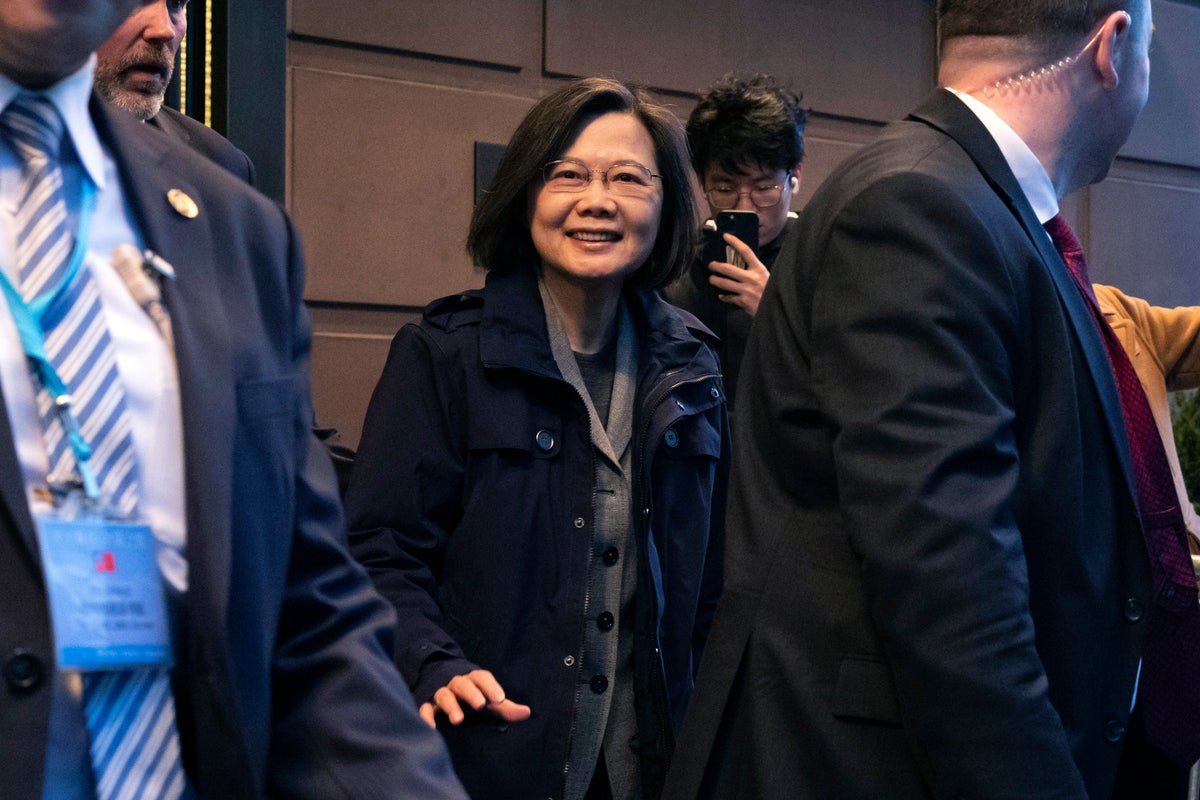
Taiwan’s president is beginning a swing through the United States and Central America, a visit aimed at showing that her self-ruled island has allies as it faces a rising threat from China.
Taiwan was carefully calibrating President Tsai Ing-wen's stops in the United States, and as always forgoing any official meetings with senior U.S. leaders in Washington, in an effort to contain what China said would be a strong but as yet unspecified response.
Tsai arrived in New York on Wednesday and was scheduled to spend Thursday in the city, but few details of the trip were made public.
A senior Chinese diplomat in Washington, embassy charge d'affaires Xu Xueyan, pointed to an expected meeting between Tsai and House Speaker Kevin McCarthy elsewhere in the country. The meeting would have serious repercussions overall and a “serious, serious, serious” impact on U.S.-China relations, she said in a virtual session with reporters on Wednesday.
Sen. Robert Menendez, a New Jersey Democrat and chairman of the Senate Foreign Relations Committee, said he hopes any U.S. officials meeting unofficially with the president convey that American support for Taiwan is "strong and unequivocal.”
Taiwan is an important partner for Washington in the Indo-Pacific and a major recipient of U.S. military aid. The U.S., Taiwan and their allies in the region are boosting their military readiness with the aim of deterring or defending against any future military action by China, which claims the island as its own.
Last August, Beijing responded to the visit of then-House Speaker Nancy Pelosi to Taiwan by launching missiles, deploying warships across the median line of the Taiwan Strait and simulating a blockade of the island. China also temporarily suspended dialogue with the U.S. on climate and other major issues and restricted military-to-military communication with the Pentagon.
Tsai has made six trips through the U.S. during her presidency, meeting with members of Congress and members of the Taiwanese diaspora. Administration officials are underscoring that her coming trip, which Taiwan calls a “transit,” is in line with what she and her predecessors have done in the past.
Tsai's "transit is consistent with our long-standing unofficial relationship with Taiwan and is consistent with the United States' one-China policy, which remains unchanged,” White House national security spokesman John Kirby told reporters Wednesday.
“The People’s Republic of China should not use this transit as a pretext to step up any aggressive activity around the Taiwan Strait," Kirby said. “The United States and China have differences when it comes to Taiwan. But we have managed those differences for more than 40 years.”
Tsai told reporters before boarding her plane to the United States that “Taiwan will resolutely safeguard the values of freedom and democracy."
“External pressure will not obstruct our resolution to engage with the world,” she said.
Tsai is expected to meet with the American Institute in Taiwan chair, Laura Rosenberger. AIT is the U.S. government-run nonprofit that carries out unofficial relations with Taiwan.
Her stops in Central America are expected to shore up Taiwan's partnerships there, after Honduras this month switched its diplomatic relations from Taiwan to China. Tsai accused China of using “dollar diplomacy” to lure away Honduras. Just 13 countries now officially recognize Taiwan.
Republican Rep. Mike Gallagher of Wisconsin, the chairman of the House Select Committee on China, said the visit is a chance for Tsai “to convey to the Congress how important the partnership between the U.S. and Taiwan is, and what’s necessary to preserve peace and stability across the Taiwan Strait.”
Xu, the Chinese diplomat in Washington, accused Taiwan and the U.S. of harboring other aims for her trip.
“It should be clear to all that the so-called transit is merely a disguise to her true intention of seeking breakthrough and advocating Taiwan independence," she said.
Tensions between Washington and Beijing have grown as China under President Xi Jinping seeks to expand its regional and global influence. Passage of what the U.S. said was a Chinese spy balloon across the U.S. this winter heightened Americans' sense of challenge from China. China says it was a research balloon that was blown off course.
——
Associated Press writers Josh Boak and Aamer Madhani contributed to this report.







